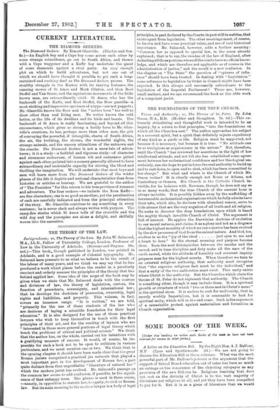THE THEORY OF THE LAW.
Jurisprudence; or, The Theory of the Law. By John W. Salmond, MA., LL.B., Fellow of University College, London, Professor of Law in the University of Adelaide. (Stevens and Haynes. 18s. net.)—This book,, though published in London, was printed in Adelaide, and is a good example of Colonial typography. Mr. Salmond here presents to us what we believe to be the result of the labour of many years, and we think we may say that he has produced a work which places before the reader in a peculiarly succinct and orderly manner the principles of the theory that lies behind applied law. Some idea of the scope of the book may be given when we state that Mr. Salmond deals with the sources and divisions of law, the theory of legislation, custom, the function of precedents, sovereignty, and international law ; that he develops the doctrines of possession, ownership, legal rights and liabilities, and property. This volume, in fact, coven an immense range. "It is written," we are told, "primarily for the use of those students of the law who are desirous of laying a scientific foundation for their legal education." It is also designed for the use of those practical lawyers who wish to keep themselves in touch with the first principles of their art, and for the reading of laymen who are "interested in those more general portions of legal theory which touch the problems of ethical and political science." We think that the author has, on the whole, carried out his intentions with a gratifying measure of success. It would, of course, be im- possible for such a book not to be open to criticism in various particulars, and we must mention one or two. We think that in the opening chapter it should have been made clear that the great Roman jurists recognised a practical jus naturals that played a most important part in the development of Roman law, a part quite distinct from that unprofitable "literature of natural law" which the modern jurist has evolved. Mr. Salmond's passage on the common law seems to add confusion, if possible, to the signifi- cance of that unhappy term. The phrase is used in three senses, —namely, in opposition to statute law, to equity, to civil or Roman law. But its main meaning to the modern lawyer is a body of legal
principles, in part declared by the Courts, in part still in stabilise, that exists apart from legislation. The other meanings must, of course, be known and have some practical value, and are of vast historical importance. Mr. Salmond, however, adds a further meaning : "Common law as opposed to special law, in the sense already explained; that is to say, the residue of the law of England, after deducting all those portions whereof the courts have no official know- ledge, and which are therefore not applicable as of course in the administration of justice," and the result is a new confusion. In the chapter on "The State" the question of "spheres of influ- ence" should have been treated. In dealing with " Legislation " some reference to legislation by Order in Council might have been expected. Is this always and necessarily subordinate to the legislation of the Imperial Parliament? These are, however, small matters, and we can recommend the book as the able work of a competent jurist.






































 Previous page
Previous page